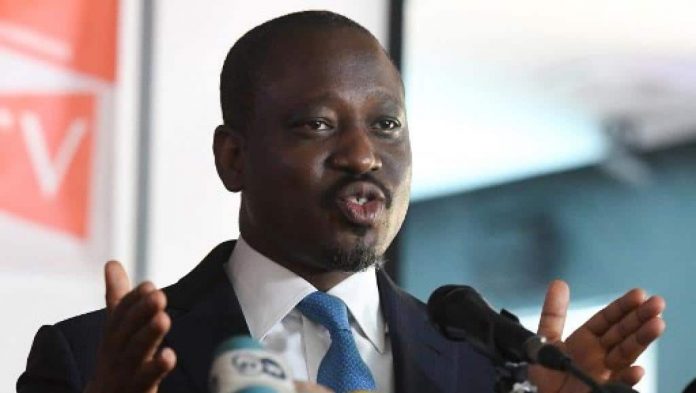Despite the rejection of his candidacy by the Constitutional Court, the former Speaker of Parliament still pretends to believe in his presidential destiny.
Three days after the Constitutional Court of Côte d’Ivoire rejected his candidacy, the opponent and former rebel leader, exiled in France, Guillaume Soro pretends to still believe in his presidential destiny. On Monday, September 14, his candidacy was deemed inadmissible by judges because of a conviction by his country’s judiciary to twenty years in prison and a fine of 4.5 billion CFA francs (some 7 million euros) for “embezzlement of public funds” and “money laundering”. The court also deprived him of his civil rights for five years.
Despite this, on Thursday, September 17, during a press conference held in the lounges of a Parisian grand hotel, the former president of Parliament reaffirmed that he maintained his candidacy in a “firm, irreducible and irrevocable” manner. Guillaume Soro is relying in particular on an order issued 48 hours earlier by the African Court of Human Rights (ACHR) which “orders” the Ivorian state to “immediately remove all obstacles preventing Guillaume Soro from enjoying his rights to elect and be elected”. “When the judges are not corrupt like those in my country, they say the law and give him back his letters of nobility,” rejoiced Guillaume Soro.
There is nothing to say that the Ivorian government will comply with the ACHR’s injunction when it had remained deaf to a previous decision of the same institution, dating from April, which had vainly ordered the State to “stay the execution of the arrest warrant issued against Guillaume Kigbafori Soro”. Worse, Soro was convicted only one week after this judgment. In the aftermath, Côte d’Ivoire decided to withdraw from the ACHR.
“Constitutional Coup d’Etat”
On Thursday, Guillaume Soro also called on the opposition to unite for “transparent elections” and “stop in his mad adventure” the outgoing president Alassane Ouattara, his former ally and brother fighting in 2010 against the power of Laurent Gbagbo.
Certainly, the Ivorian opposition denounces the candidacy of Alassane Ouattara for a third term. It considers it unconstitutional and, morally, as a denial of the word given. The head of state had indeed committed to giving a free voice to a new generation and had given up the idea of running for re-election. A commitment that was shattered after the brutal death on July 8 of the man he had chosen to succeed him, his friend, his dolphin, his Prime Minister Amadou Gon Coulibaly.
Guillaume Soro thus accused his former mentor of a “constitutional coup d’état” and called on the opposition to “block”. The problem for him is that part of this opposition decided to participate on October 31 in what he calls a “masquerade”. “Maintaining the election of October 31 makes no sense, to participate in it would endorse the institutional coup d’état of Alassane Ouattara,” he hammered. “I will not go to the elections as long as [Alassane] Ouattara is a candidate, it would validate the forgery,” he added.
“The ballot of October 31 will not take place.”
But several opposition heavyweights do not share this opinion. On Monday, at the same time as it rejected the candidacy of Guillaume Soro and Laurent Gbagbo, the Constitutional Court retained that of three other opponents. Former president Henri Konan Bédié (1993-1999), former prime minister under Laurent Gbagbo (2000-2010), Pascal Affi Nguessan, and former deputy Kouadio Konan Bertin, a dissident from Mr. Bédié’s party, are determined to play the electoral game.
Thus, when Guillaume Soro says and repeats that “the elections of October 31 will not take place,” it is worth asking whether this is not just wishful thinking. He did not mean anything about the strategy he intends to use to achieve this result. The former rebel has lost its strike force. Removed from the political scene, isolated far from his lands, he no longer seems able to mobilize the streets.
Admittedly, skirmishes provoked in particular by supporters of Laurent Gbagbo accompanied, Tuesday, in several localities of the country, the decision of the Constitutional Court. In August, the announcement of Alassane Ouattara’s candidacy had also provoked clashes, particularly community clashes, which resulted in about fifteen deaths. In 2010, the crisis arising from Laurent Gbagbo’s refusal to acknowledge his electoral defeat at the hands of Alassane Ouattara resulted in some 3,000 deaths. Few want to replay this bad scenario.
Source: Le Monde































